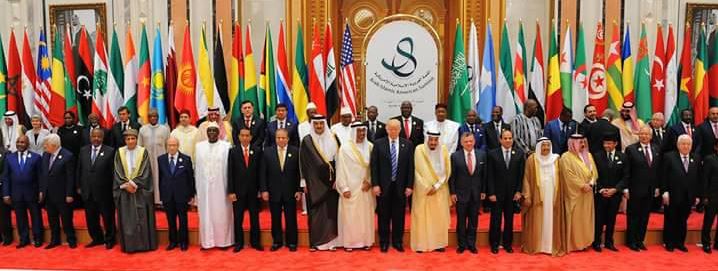Last Monday, a picture was taken in Saudi Arabia of a glowing globe controlled by the six hands of the King Salman of Saudi Arabia, President Donald Trump of the United States, and President Abdel-Fattah El Sisi of Egypt. The three leaders were participating in the opening event of the new Global Center for Combating Extremist Ideology. Trump and Sisi were visiting Saudi Arabia, where arms deals worth $110 billion were struck between Saudi Arabia and the U.S. Those meetings—and the rest of the trip in the region, which included praise for the Israeli and Palestinian governments and harsh words for Iran—signaled a return to the old days of American relationships in the Middle East, where countering Iran and terrorism were the dominant themes. The new arrangements will exclude the United States pressuring for more democracy, human rights, and freedom of speech in the region, with Trump not mentioning these issues in public.
It is clear now that U.S.-Egyptian relations are entering a new phase which will affect politics domestically and regionally. After decades of relations based on Camp David and American recommendations of more neoliberal and democratic reforms in Egypt, it seems like we are approaching the post-Camp David era in American-Egyptian relations—or, more generally, American-Middle Eastern relations—which will take “fighting terrorism” as a theme. Trump will do what he promised to do during his campaign, which is take money from the Gulf states in exchange for cooperation, and not comment on the human rights situation in his allies’ states in the Middle East. Prior to Sisi’s visit to Washington in April, the White House made clear that it would no longer allow human rights to become a public issue of concern, as it said in a statement that both leaders would focus instead on security and economic issues.
In Egypt, we see the consequences of these arrangements happening quickly. On Sunday, a law governing nongovernmental organizations was published in the Official Gazette after having been ratified by Sisi. The law, which had been passed by the House of Representatives in November before disappearing from the parliamentary and presidential agendas, places strict regulations on NGOs and criminalizes a broad swathe of normal civil society work, continuing a wave of moves against civil society that has been ongoing for several months.
The ongoing crackdown on several Egyptian political parties and groups after the opposition started to talk about a possible participation in the coming presidential elections, has now reached the arrest of the most talked-about potential challenger to Sisi. Last Wednesday, Egyptian police arrested lawyer and founder of the Bread and Freedom Party Khaled Ali, whom they accused of “public indecency” over the use of “an indecent hand gesture” in a protest following court proceeding against moving the Egyptian islands Tiran and Sanafir to Saudi Arabia. Ali had filed a lawsuit against the government over the islands treaty, which put it on hold. Thus, his arrest hit two birds with one stone: Not only was it revenge for his legal case against the Egyptian-Saudi treaty, but it could also be the end of his presidential ambitions if he is found guilty, according to lawyers.
At the same time, the blocking over 20 Egyptian news websites for “supporting terrorism” is a clear manifestation of the use of this phrase to crack down on professional media. While some of the blocked media outlets, including Al Jazeera, can show a clear bias in their coverage in favor of Islamist groups (which surely does not justify blocking them), some of the other blocked websites are clearly not affiliated to any terrorist or even Islamist groups. Mada Masr, for example, represents an independent website which tries to publish professional investigative and news pieces that are always critical of both Islamists and the government and is clearly against terrorist actions.
The Egyptian government has succeeded in the last few years in ending any kind of organized or non-organized political street action, but now it seems there is not even room for organized politics through its parameters and institutions. It is not only that opposition figures are being arrested and not allowed to campaign for elections, and the blocking of opposition and independent news websites, however; Sisi went as far as telling off a parliament member on air after he suggested postponing raising fuel and electricity prices.
This new arrangement in the region—taken under the pretext of fighting terrorism—is clearly establishing more authoritarian measurements which will only result in instability especially with the economic crisis taking a toll on people’s lives in Egypt, with no room for them or representatives to speak or breathe.
